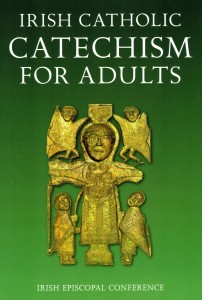 How exactly should a reform movement like ACI view the Catechism and defined doctrine in the Catholic Church? Is there a danger that – if the Catechism is not prioritised – the ‘reform’ programme would come to diverge so far from the Church’s defined teaching that it could no longer be called ‘Catholic’?
How exactly should a reform movement like ACI view the Catechism and defined doctrine in the Catholic Church? Is there a danger that – if the Catechism is not prioritised – the ‘reform’ programme would come to diverge so far from the Church’s defined teaching that it could no longer be called ‘Catholic’?
Here Aidan Hart takes this question on – by reminding us that historically the experience of God as a liberating, loving and binding power preceded the defining and systematisation of theological ideas – the Catechism.
The Israelites first became aware of God through their lived experience of His/Her acts of unconditional love towards them. That Love liberated them from the slavery, suffering, poverty and marginalisation they were experiencing in Egypt. That same Love guided them and fed them on their tortuous journey to the Promised Land of Canaan. At the making of the covenant on Mt. Sinai they experienced God’s love for them as covenant love, based on mutuality and compassionate outreach to others.
The two movements of mutuality and outreach meant that the Israelites were destined to be God’s blessing to the whole of humanity and creation. The prophets critiqued their openness and response to their experience of God’s love. Throughout the Old Testament the Israelites experienced the self-revelations of God through how He acted among them. He constantly reached out to them, set them free, forgave their sins and human failings and directed their actions to practical love for the neglected and marginalised in society. Through these lived experiences the Jews slowly, and not always linearly, came to knowledge of God as unconditionally loving and compassionate.
God’s gift to humanity of the complete revelation of Himself then came through the experience by early first century Palestinian Jews of Jesus the Christ, divine Son of God who became fully human and walked among them. He healed the sick, raised the dead to life, fed the hungry, forgave sins, died on a cross, resurrected from the dead and finally ascended back to heaven. His teachings shocked the political and religious establishment by being inclusive of everyone and not going through official channels. His catechetical method was to give those who approached Him an experience of God’s healing, compassionate, forgiving and accepting love and then to teach them. “Do this in memory of me” was Jesus’ invitation to His new community, and through them to all future members of that community, to make-present-through-remembrance a redeeming experience of divine, redeeming love in a Eucharistic meal. First came the experience!
The biblical approach to faith, based on first experiencing God’s love, often mediated through other human beings, and before attempting to define it, is both catechetically and psychologically sound. It is how human love develops – as all family members, courting couples and married people (in fact all those in loving relationships) will attest. It starts with experiences which touch the emotions, then the will and then develops through many further stages and rational processes. This applies to young and old, to the religious catechesis of children, teenagers and adults. Love, awe, wonder, joy, beauty and participation are an essential part of early religious experience.
Hence the importance of a loving family and caring parish community, of experiencing joy and Spirit-filled Eucharistic worship and other liturgies which actively involve all those present and touch the emotions, as well as the mind. It is also important for children to experience meaningful family para-liturgies in the home which involve parents and children religiously, joyfully and creatively celebrating birthdays, Christmas, Easter and other important occasions. Religion is then experienced as a normal part of family life. It is also important for them to experience the family reaching out in loving, practical service to others in need. In that way religion is experienced as a caring community, vibrant, as a way of life and not merely as church attendance on Sundays or the keeping of rules. Visit a Jewish home on a Friday evening or for their family celebration of Passover and you’ll experience something wonderful and know why the Jewish faith has survived even when their synagogues were destroyed during many pogroms over the centuries.
Catechesis cannot be left to teachers or parish clergy; nor can it be left to the family. All three together have an important role to play. They do this by providing children and teenagers with experiences of God’s love mediated through the love of others for them and of a spiritual community which is life-giving and life-affirming, which brings joy and meaning to prayer and worship, a sense of the divine Presence within them and around them, concern for others and for nature, acceptance of who they are and relevance to the participants’ stage of spiritual development. First comes the experience!
Start with the catechism and with Church doctrines, laws and regulations and the result will be a stunted growth in spirituality, boredom, gradual disillusionment and the eventual exit from the Church community by many. That exit is well under way in many parts of the world and none more so than Ireland. The cart has been put before the horse. There is an important role for doctrinal definitions and catechisms in underpinning faith, giving meaning to faith (St. Anselm’s famous dictum of theology being faith seeking understanding), establishing unity and identity, forming judgements and guiding actions. To dismiss all doctrinal truth would be to dismiss divine biblical revelation, much rabbinic and apostolic teaching and the Sacred Tradition of the Catholic Church since its birth. That sacred Tradition, built upon Hebrew Scripture and the faith of all believers channelled through Church Councils, is always evolving, as life-situations evolve, and must be given freedom to continue doing so under the guidance of the Holy Spirit. But it is not where one starts catechesis or evangelisation. First comes the experience!
What must be avoided is the bureaucratic tendency to centralise and control by defining more and more infallible doctrines and increasing regulations. Over-prescription undermines the original vision of Jesus in His Sermon on the Mount and Parable of the Prodigal Son. It kills the essential freedom of ‘the children of God’. It can seriously restrict future generations and leaders from responding appropriately to new problems and unforeseen circumstances.
Over-prescription is what the Jewish priesthood and religious establishment of Scribes and Pharisees did to the divine revelation of the Ten Commandments of the Covenant, summed up by Jesus in Matthew’s Gospel as Love God and Love One Another. The Jewish religious establishment expanded them into 613 rules and regulations to bring every aspect of Jewish life under their control, a top-down theology. This left unfulfilled their God-given vocation to be a divine presence and blessing to the whole world. The 1983 Catholic Code of Canon Law goes one better and has 1, 752 ‘regulations’.
Few would define their family by its rules and regulations and how it was structured. They think of it mostly in terms of their lived experience within it. “I was loved and accepted for myself. It gave me life and freedom to develop.” Or “My family was dysfunctional, unloving and rejected me for what I am.” The Church is the family of God, a means of bringing about the universal Kingdom of God on earth. To do that it must be experienced by its members and the wider world as a community of unconditional love, acceptance, openness, justice and mercy. Then will the world experience the redeeming presence of God in its midst, reaching out in unconditional love, mercy and service to all of humanity.
Aidan Hart, Feb 2015



